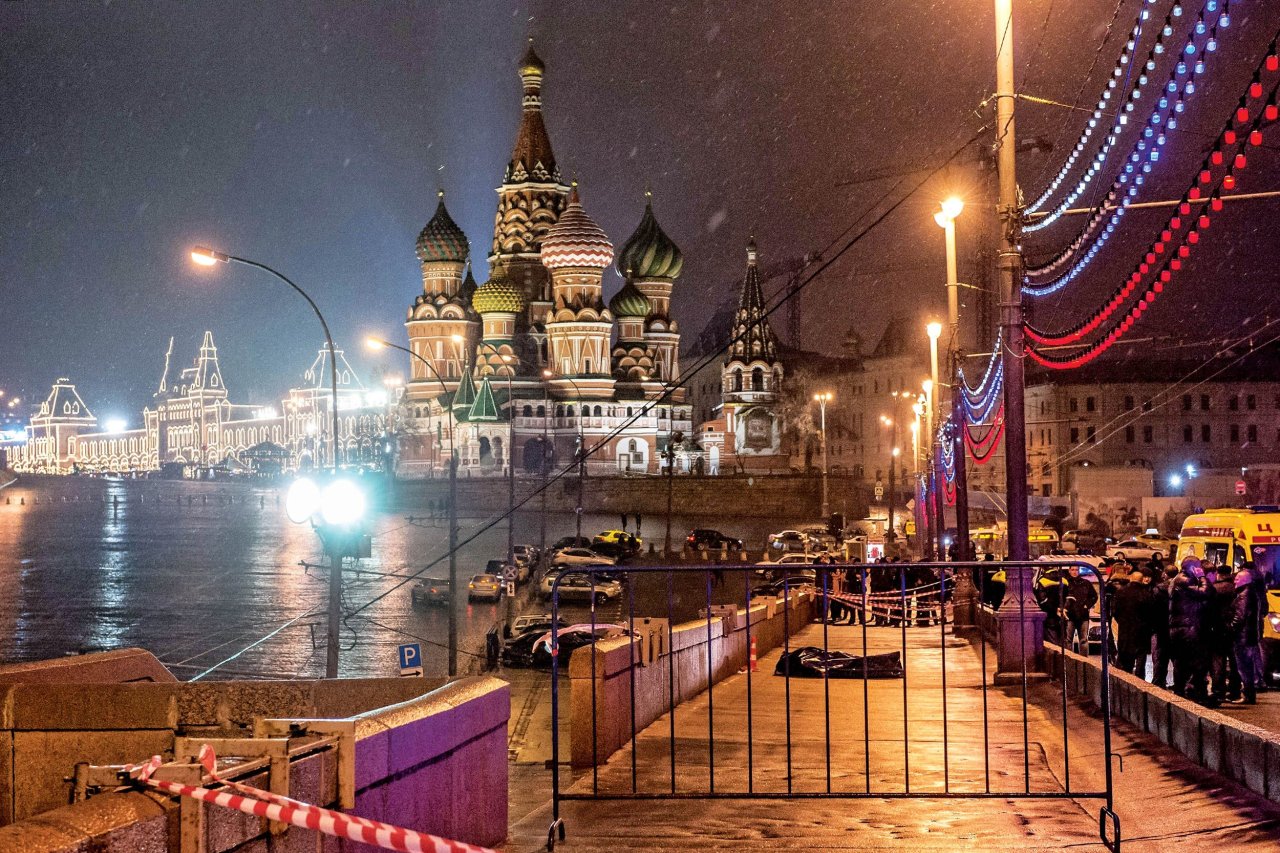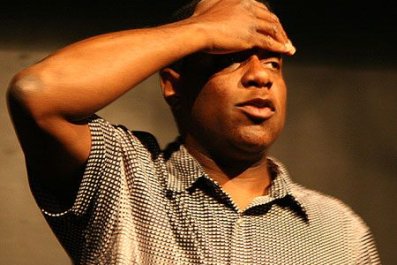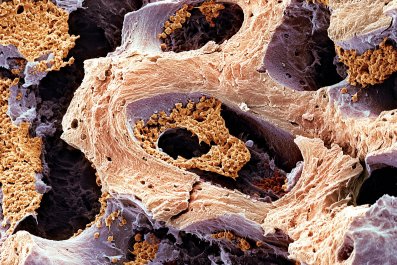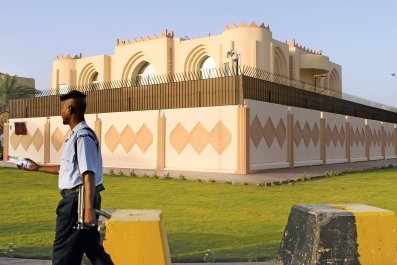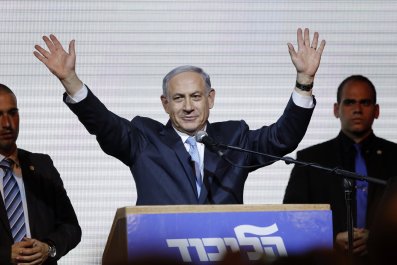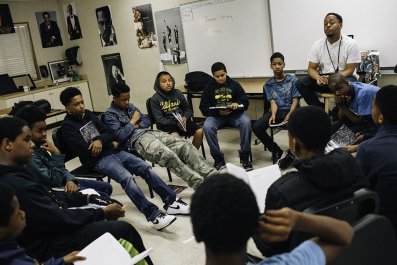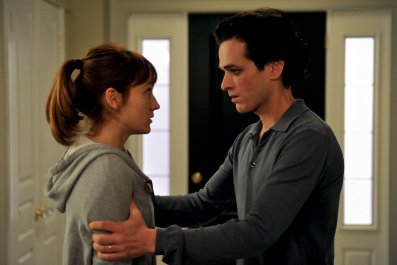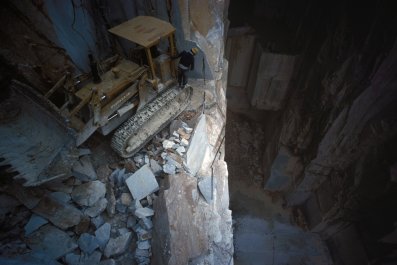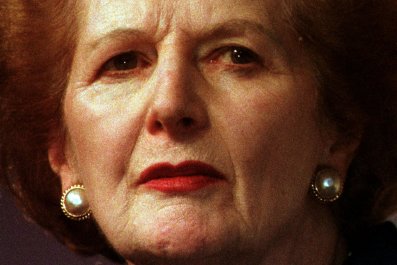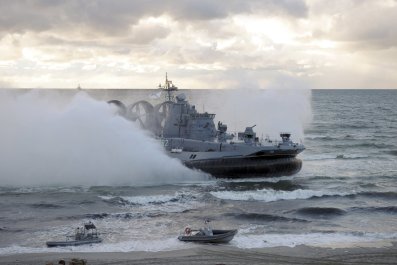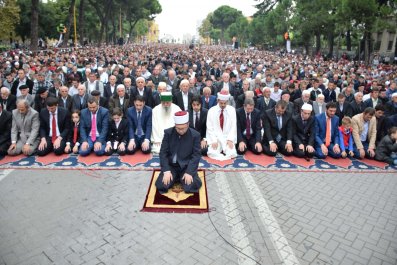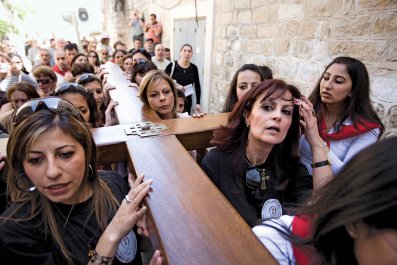No Hollywood director could have framed the grim scene better—or freighted it with more symbolism. On a drizzly Moscow night, a gunman follows Boris Nemtsov, a prominent political critic, and his girlfriend across a lonely bridge. Six shots are fired. As the victim lies bleeding, the domes of St. Basil's Cathedral and the Kremlin tower behind him. The message is clear: So die all enemies of the regime.
But who sent the message? And who was the message intended for—Russia's beleaguered opposition or President Vladimir Putin? The simplest explanation—and the one that most leaders of Russia's liberal opposition believe—is that the Kremlin killed Nemtsov to intimidate them into silence. "Putin must be held responsible for the murder of Boris," says former world chess champion and opposition leader Garry Kasparov. "Who ordered it? I don't care."
But it does matter who ordered the hit. It would be scary enough if the assassins were working at Putin's command. But it's even more frightening if they were not. And the evidence is mounting that Nemtsov was shot by a security services-connected death squad let loose in Russia's capital. Five suspects have been apprehended, all of them from Chechnya (a sixth blew himself up with a grenade rather than be taken alive, police say). The mastermind of the operation, according to Russia's Federal Security Service, or FSB, was Zaur Dadayev—a man with close ties to a Chechen rebel-turned Putin loyalist, Ramzan Kadyrov.
A 'Screw You!' to Putin
Dadayev—who confessed but later withdrew his statement, claiming he was tortured—served as the deputy commander of an Interior Ministry paramilitary unit known as Battalion Sever, which has long been the Chechen leader's Praetorian Guard. Following Dadayev's arrest, Kadyrov—using Instagram, his favored means of sharing pictures of himself in his private zoo and communicating his political views to the outside world—called the suspect "a true Russian patriot." He also suggested that Dadayev had been offended by Nemtsov's support of the Charlie Hebdo cartoonists murdered by Islamist gunmen in Paris. After evidence leaked in a Moscow newspaper indicating Dadayev had been surveilling Nemtsov's apartment long before the Paris attacks, Kadyrov began saying his lieutenant was innocent and accused the Russian media of concocting a "conspiracy" to undermine both Dadayev and himself.
No matter who ordered Nemtsov's murder, there's little doubt that Kadyrov considered him a traitor to Russia and a personal enemy. In 2011, when Nemtsov and hundreds of thousands took to the streets in Moscow, protesting Putin's return to power, Kadyrov called for the opposition leader to be imprisoned. "Kadyrov is a very psychologically sick man," Nemtsov responded. This year, Kadyrov has been a prominent organizer of the Russia-wide "anti-Maidan" movement, the goal of which is to block the kind of anti-regime protests that toppled a corrupt, pro-Russian government in Kiev, Ukraine, last year. Nemtsov was one of the leaders of demonstrations in Moscow against the annexation of Crimea—and came under fire from Russian nationalists for appealing to the United States and the European Union to tighten sanctions against the Kremlin. Russian state-controlled TV portrayed Nemtsov and his fellow opposition leader, Alexei Navalny, as American-funded stooges—and Putin spoke of a "fifth column" of enemies inside Russia.
Nemtsov wouldn't be the first Kadyrov critic to wind up dead—investigative reporters Anna Politkovskaya and Natalia Estemirova were shot and killed while working on stories about corruption and violence in Chechnya. Politkovskaya was murdered outside her Moscow apartment in 2006, shortly after calling Kadyrov the "Stalin of our times." Estemirova was kidnapped and shot in Grozny in 2009 after writing about Kadyrov's alleged involvement in torture and extrajudicial executions, which he denied.
The more pressing question, though, is whether Putin is still able to control Kadyrov. Even if the Kremlin leader agrees that Nemtsov was a traitor, "that doesn't necessarily make it OK to murder him," says the long-serving editor-in-chief of one of Russia's most prominent newspapers, who asked for anonymity because of the matter's sensitivity. "The Kremlin was in shock, of course. When you have people running around the streets of Moscow choosing who lives and who dies—that's not OK." According to the newspaperman, who until his recent retirement attended regular meetings with Putin and his top lieutenants, "this was a kind of 'screw you!' to Putin. [The killers] were saying, Sure, boss, you make the rules. But we get to execute them how we like."
Going Rogue
In a political system like Russia's, where Putin has replaced formal institutions with what his supporters call "personal control," the unwritten rules of court politics are paramount. "Signals and gestures matter," says Brian Whitmore, author of The Power Vertical, an influential blog for Kremlinologists. "They have to, because the law doesn't apply to those on the top…. Killing somebody this prominent, and certainly doing the deed blocks from Red Square, was against the rules."
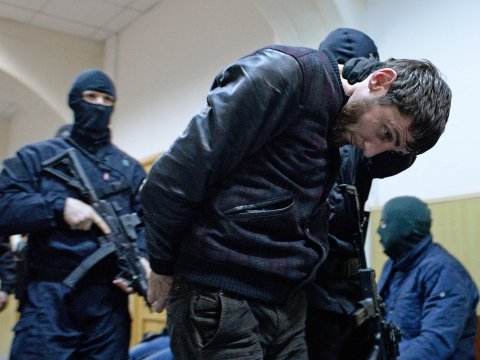
Whitmore and many leading Kremlin watchers see the Nemtsov assassination as part of an unfolding war among Russia's siloviki—the military, police and KGB men who control the security services. Kadyrov is among the most powerful men in Russia. He commands thousands of armed loyalists, and he described Putin as "a father" to him after the assassination of his own father in 2004. For years, the admiration was mutual. Putin even bestowed a valor medal on the Chechen strongman for pacifying his rebellious province a few days after the Nemtsov assassination—before the extent of the links between the Chechen suspects and Kadyrov emerged. But Kadyrov has also acquired dangerous enemies, from FSB chief Aleksandr Bortnikov to top Kremlin courtiers, including Putin's chief of staff, Sergei Ivanov. Regardless of who actually ordered Nemtsov's death, Kadyrov's detractors in the security services now appear to be using the killing against him by leaking damaging details to the press.
It's not surprising that Putin's lieutenants are at loggerheads. But it would be a shocking shift if they're in fact killing their enemies in the street. If Kadyrov, for instance, has indeed gone rogue, there's little Putin can do about it. "Kadyrov has put Putin in a hopeless situation," says former parliamentarian and liberal opposition politician Konstantin Borovoi. "The Russian president can neither punish nor remove him, because Chechnya is so difficult to control."
The deeper problem is that Putin has created a system in which he has "monopolized not only the decision-making process in Russia but also the very ability to make decisions," says Putin biographer and critic Masha Gessen. When the Russian leader disappeared from public view for 10 days early in March, the country's political class grew nervous and the blogosphere traded stories about coups, strokes and even Putin's alleged love child. The rest of the country didn't seem to notice Putin's absence—despite a series of comic mix-ups on state-controlled TV when prerecorded video of the president's supposedly busy schedule aired in the wrong order. But Putin's brief disappearance offers a glimpse into just how dependent on him the Russian state has become—and suggests that chaos is likely to be Putin's principal successor.
'A Pandora's Box of Paranoia and Violence'
It wasn't always the case. Just three winters ago, liberal, middle-class supporters of departing president Dmitry Medvedev filled Moscow and St. Petersburg, demanding fair elections and more political liberty and free speech. Today, the same streets are filled with patriotic crowds waving banners saying, "Crimea is ours—Obama don't envy us," "America, keep your hands off" and "I am proud of my country." (Photos later surfaced on Russian social media of queues of these patriots, hiding their faces from the camera and apparently lining up to be paid for their attendance.) "What we are seeing now is the death throes of the old liberal opposition," says blogger Anton Krasovsky, who worked as chief of staff for oligarch Mikhail Prokhorov's unsuccessful presidential campaign against Putin in 2012. "Boris's death was a kind of symbolic parting with the past. With him died the old legend of the Young Reformers, of the leaders of the Bolotnaya [Square] protests and so on."
After military parades marking the anniversary of the annexation of Crimea, Putin gravely told Russian TV's Channel One he had considered authorizing the use of tactical nukes in the peninsula against "the NATO threat." On the same day, leading journalist and opposition activist Ksenia Sobchak announced she was thinking of leaving Russia after she learned her name was on a Chechen hit list of liberal "traitors."
"It would be in some way less worrying if Putin had ordered Nemtsov's killing," blogged Sobchak, who has known Putin since childhood because her father was the first mayor of post-Soviet Leningrad—and Putin's boss and patron. "It would be an awful system, but at least a system, a manageable system. But this is not the case. There is no Putin who gave a command to kill. But there is a Putin who has built a hellish Terminator and he has lost control of it. There is no one controlling the process any more—there is chaotic hatred that is fueled every day by the federal mass media."
The more disturbing story behind Nemtsov's murder is that the Kremlin has opened a Pandora's box of paranoia and violence that it can no longer control. Nemtsov's killing may come to be seen as a turning point—not only as the day when the liberal opposition lost a leader but also as the day the ultranationalist death squads first took to the streets of Moscow. As Sobchak puts it, the rounds that killed Nemtsov "are only the first six bullets. There are troubled times ahead."



